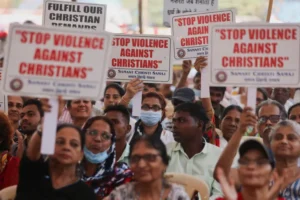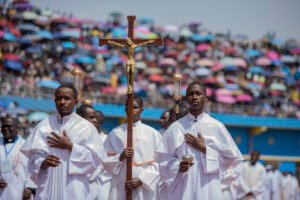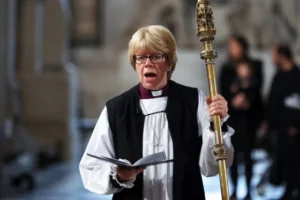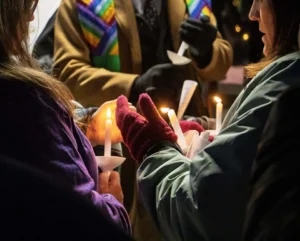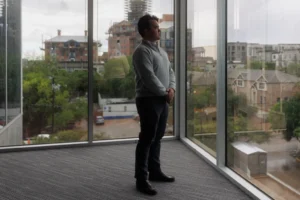Pope Francis’ Health and the Future of the Papacy
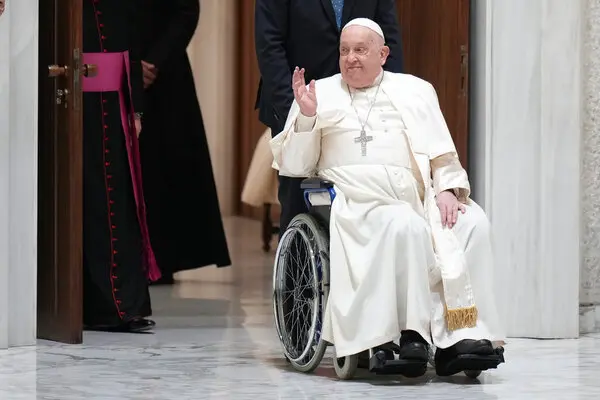
Pope Francis’ health and the future of the papacy have become closely watched topics as Catholics consider leadership continuity, succession, and the direction of the Church.
Introduction to Pope Francis
Pope Francis, born Jorge Mario Bergoglio on December 17, 1936, in Buenos Aires, Argentina, made history on March 13, 2013, by becoming the first Jesuit pope and the first pope from the Americas. His election marked a significant moment not only for the Catholic Church but also for the broader world, as he brought a fresh perspective to the papacy. Rising through the ranks of the Church, he served as Auxiliary Bishop of Buenos Aires and later as Cardinal, reflecting a deep commitment to pastoral care and social justice, themes that are prevalent in his papacy.
His Jesuit background is pivotal, often emphasizing the importance of education, community service, and spiritual discernment. As a member of the Society of Jesus, he has imbued his leadership with the principles of humility and service, focusing on the marginalized and advocating for a more inclusive Church. This approach helped him resonate with many Catholics and non-Catholics alike, redefining the image of the Catholic Church in contemporary society.
Throughout his papacy, Francis has addressed various global issues, ranging from poverty and immigration to climate change, emphasizing that the Church must engage more fully with modern challenges. His encyclicals, particularly “Laudato Si’,” underscore his commitment to environmental stewardship and social responsibility. This dedication to contemporary issues has positioned him as a Vatican leader who seeks to bridge traditional beliefs with modern societal needs. As we explore Pope Francis’ health, history, and the future of the papacy, it becomes evident that his role extends far beyond that of a religious figurehead, as he promotes a more compassionate and relevant Church for the 21st century.
Current Health Status of Pope Francis
Pope Francis, the 266th pope of the Roman Catholic Church, has been open about his health challenges over the past few years. In July 2021, he underwent intestinal surgery to remove a part of his colon, a procedure that was deemed successful. Since then, the pontiff has made several public appearances, albeit with noticeable adjustments to his schedule. His team has carefully managed his engagements to accommodate his recovery and ensure he remains engaged with the faithful while addressing any ongoing health concerns.
Despite undergoing surgery, Pope Francis has continued to fulfill many of his papal responsibilities. He has been seen actively participating in events, such as audiences, prayer services, and international trips, although some activities have been scaled back. Notably, during public events, he has occasionally used a wheelchair, drawing attention to the physical challenges he faces. This adjustment reflects a broader approach within the Vatican to prioritize the health of the pope while maintaining the tradition and visibility of the papacy.
Recent reports have indicated that the pope’s health remains an evolving issue. Medical professionals emphasize that his age and previous surgeries warrant constant monitoring. The Vatican typically communicates updates on the pope’s health through official statements, aiming to balance transparency with the dignity of his office. This cautious communication strategy helps reassure the public regarding his well-being and address any speculation that may arise from his condition.
As Pope Francis navigates his health challenges, his resilience remains a key aspect of his pontificate. His experiences underscore the importance of health in leadership roles, and he has consistently demonstrated a proactive approach to maintaining his health while fulfilling his pastoral duties. The Catholic community watches closely, recognizing that his health influences both his personal ministry and the future trajectory of the papacy.
Historical Context of Papal Health
Throughout its extensive history, the papacy has been marked by a variety of health issues affecting the lives and effectiveness of numerous popes. Medical conditions have not only influenced personal well-being but have also had significant implications for the governance of the Church. A remarkable case is that of Pope Pius IX, who reigned from 1846 to 1878 and faced numerous health challenges, including a serious illness in 1870 that profoundly limited his ability to lead, impacting church decisions during that tumultuous period. His declining health eventually led to the loss of temporal power and the consolidation of Vatican authority.
Moreover, Pope Leo XIII, who presided from 1878 to 1903, also encountered significant health challenges, including chronic respiratory issues. Despite his age, he remained active in papal duties, illustrating resilience against health-related setbacks; however, his eventual failure to attend to the Vatican’s business due to illness prompted concerns regarding the continuity of leadership and stability within the Church. This highlights how health disparities not only affect individual popes but can also create vulnerabilities within the papacy itself.
In considering more recent events, Pope John Paul II’s battle with Parkinson’s disease profoundly influenced perceptions of the papacy. As his health deteriorated in the later years of his papacy, the visible struggle burdened Church operations and prompted discussions about succession planning and the role of aging leaders in such dynamic times.
The ongoing health issues faced by Pope Francis, including his struggles with sciatica, echo this historical narrative, as they present both unique challenges and potential implications for the future of the papacy. By reflecting on past health crises among popes, we can gain insight into how the health of the pontiff has shaped the Church and its leadership, fostering a greater understanding of Pope Francis’s current situation and its potential future impact.
Pope Francis and Modern Challenges
Pope Francis has emerged as a significant figure in addressing modern challenges facing the Catholic Church and society at large. His approach to social justice exemplifies this commitment, emphasizing the Church’s role in advocating for the marginalized and promoting equitable treatment of all individuals. From his earliest statements as pope, he has prioritised the need to uplift the poor, highlighting economic inequalities and calling upon the global community to eradicate poverty. This call for social justice aligns with his belief that faith must be accompanied by action, prompting a renewed focus on humanitarian aid and outreach within Catholic communities.
Climate change represents another critical challenge that Pope Francis has vigorously confronted. In his 2015 encyclical, “Laudato Si’,” he addressed environmental degradation, urging both the faithful and secular leaders to recognize the urgent need for ecological responsibility. The encyclical framed climate change not merely as an environmental issue but as a moral one, linking it to the dignity of human life. This holistic perspective has encouraged discussions on sustainability, intergenerational justice, and the ethical implications of environmental policy, marking a vital shift in how the Church engages with global issues.
Interfaith dialogue has also been a significant focus of Pope Francis’s papacy. He has made strides in fostering relationships among different religions, encouraging mutual understanding and respect among diverse faith communities. This commitment is particularly important in contemporary society, where religious divisions can lead to conflict and strife. By championing interfaith dialogue, he seeks not only to promote peace but also to address the root causes of tensions that undermine collective human progress.
However, as Pope Francis continues to tackle these contemporary issues, his health must be acknowledged as a critical factor influencing his capacity for leadership. Recent health challenges have led to questions about his ability to sustain his vigorous schedule and engage effectively with pressing matters. The Vatican’s plans for the future papacy may depend on how his health trajectory unfolds, underscoring the dynamic nature of leadership in the Catholic Church and the challenges that lie ahead.
The Vision for the Future of the Papacy
Pope Francis has articulated a progressive vision for the future of the papacy, emphasizing the need for reform and adaptation within the Catholic Church. He firmly believes that the role of the pope should not merely be that of a traditional figurehead but rather a leader who engages with contemporary issues facing the global community. His approach includes a commitment to decentralizing authority within the Church, empowering local bishops, and encouraging a more participative governance structure. This shift aims to foster a sense of shared responsibility among clergy and laity alike, reflecting a more synodal Church.
One of Pope Francis’s critical aspirations is to prioritize pastoral care over dogmatic rigidity. He envisions a Church that is more inclusive and compassionate, actively addressing social injustices, economic disparities, and environmental concerns. This vision is particularly evident in his encyclicals, which have resonated with broader audiences, inspiring action not just within the Church but across society. By embracing a more open dialogue on contentious issues such as sexuality, divorce, and interfaith relations, Pope Francis seeks to position the Church as a beacon of hope and support for marginalized communities.
Moreover, Pope Francis envisages the papacy adapting to a rapidly changing world characterized by technological advancements and shifts in societal norms. He advocates for a Church that not only keeps pace with modernity but also leads with moral clarity in addressing challenges such as climate change and global inequality. His legacy, therefore, is likely to be one of transformation and renewal, where the papacy is seen not merely as a rhetorical authority but as a vibrant force for good in the world.
The Role of Succession in the Papacy
The process of succession within the papacy is an essential aspect of the continuity and stability of the Catholic Church. When a pope passes away or resigns, the College of Cardinals convenes to select a new leader during a conclave. This process is guided by established traditions and the desire for unity, yet it is also influenced by various factors including theological perspectives, geographical representation, and the current needs of the Church. As Pope Francis has made significant changes during his pontificate, these modifications have the potential to shape future papal elections and the selection criteria for candidates.
The transitional period following Pope Francis raises questions about possible successors who embody the values and vision he has promoted. Noteworthy figures within the College of Cardinals may include those who have been actively involved in reform or those who represent regions where Catholicism is experiencing growth, such as Africa and Asia. Each candidate brings unique perspectives and leadership styles that reflect the diverse nature of the global Church, which is now more than ever fragmented by cultural and social issues.
Furthermore, the implications of these transitions extend beyond mere leadership changes. The selection of a new pope can influence the Church’s approach to pressing matters such as social justice, interfaith dialogues, and responses to contemporary moral dilemmas. Each new papal leader has the potential to either uphold or redirect the mission of the Church in various global contexts. Therefore, the role of succession is not only about who will lead the Church next but also about how that leadership will navigate the challenges of the modern world, ultimately determining the future trajectory of the Catholic faith.
Impact of Technology on the Papacy
In recent years, the influence of technology on the papacy has become increasingly significant, reshaping the methods through which the Vatican communicates with its global audience. The advent of social media platforms, such as Twitter, Facebook, and Instagram, has enabled popes, particularly Pope Francis, to connect more directly and personally with millions of followers worldwide. This direct engagement has transformed the papacy into a more accessible institution, blurring traditional barriers and fostering a sense of community among the faithful.
Pope Francis, known for his innovative approach, has embraced technology as a vital tool for evangelization and outreach. Since his election in 2013, he has consistently utilized social media to convey messages of hope, compassion, and inclusivity. His Twitter account, with millions of followers, is used to share daily reflections, prayers, and updates on church activities. This digital approach not only enhances the visibility of the papacy but also allows the Pope to engage with younger generations who predominantly communicate through these platforms.
Moreover, the Vatican has adapted to the digital age by broadcasting papal events, such as masses, audiences, and special gatherings, online. This accessibility is particularly crucial during extraordinary circumstances, such as the COVID-19 pandemic, when public gatherings were restricted. Such innovations have reaffirmed the relevance of the papacy in the modern world, ensuring that the faithful can connect with the church from anywhere in the world.
Looking to the future, it is likely that succeeding popes will continue to harness the power of technology to further engage with their parishioners. As advancements in communication technology evolve, they will present new opportunities for outreach and community building within the church. Balancing traditional teachings with modern communication practices will undoubtedly be a challenge, yet it also represents an opportunity for a more vibrant and inclusive papacy that resonates with a diverse global population.
The Global Response to Pope Francis
Pope Francis has undeniably made a significant impact on the Catholic Church and its image around the world since his elevation to the papacy in 2013. His approach to pastoral care, social justice, and interfaith dialogue has garnered both ardent support and notable criticism. In regions such as Latin America, where he originated, he is often celebrated for his emphasis on addressing social inequalities and advocating for the marginalized. His calls for a more inclusive Church resonate strongly within communities that have historically felt neglected.
Conversely, in certain Western nations, there are mixed opinions regarding his progressive agenda, particularly relating to issues such as LGBTQ+ rights, contraception, and divorce. Some traditionalists within the Church perceive his reformist perspective as a departure from orthodox teachings. This division in viewpoints illustrates the complexities surrounding Pope Francis’s leadership, as different global regions grapple with their own cultural and social contexts. The Pope’s health, particularly following incidents that raised concerns over his vitality, has also influenced public perception. His physical condition often triggers discussions about potential successors and the future direction of the papacy, thereby amplifying both support for and skepticism about his legacy.
Moreover, in areas marked by socio-political turmoil, such as the Middle East and parts of Africa, Pope Francis is viewed as a beacon of hope and stability. His advocacy for peace and reconciliation has the potential to transcend borders and foster dialogue among different faiths. Despite facing harsh criticism from some quarters, the Pope’s holistic outreach has strengthened ties between the Catholic Church and other religions, showcasing the importance of collaboration in today’s global society.
Conclusion: The Future of Pope Francis and the Papacy
Pope Francis has undoubtedly played a pivotal role in shaping the contemporary Catholic Church. His tenure has been marked by a commitment to social justice, interfaith dialogue, and a more inclusive approach towards various marginalized communities. However, his ongoing health challenges present both immediate concerns and broader implications for the future of the papacy. As he navigates these difficulties, the potential impact on his leadership style and the Church’s direction becomes increasingly relevant.
In reflecting on Pope Francis’s past contributions, it is clear that he has emphasized a vision of a Church that is more attuned to modern societal issues. His efforts in championing environmental stewardship, advocating for refugees, and addressing clerical abuses signal a transformative approach aiming to reinvigorate the Catholic faith among the faithful. This inclusive perspective indicates a shift towards a pastoral care model that prioritizes empathy and understanding, traits essential in the evolving landscape of religious engagement.
As the Catholic Church moves forward, Pope Francis’s health will undoubtedly influence the dynamics of papal leadership. The potential for a successor, one who may either continue or deviate from his reformist vision, raises questions about the future of the Church’s mission in the world. The evolving nature of the papacy hints at a dialogue that must continue, whether through Francis’s ongoing work or the contributions of future leaders. The challenges and opportunities posed by globalization, secularism, and modernization may well redefine the role of the papacy in the 21st century.
In conclusion, Pope Francis’s legacy will hinge on how his health challenges and his vision for an inclusive Church converge, ultimately shaping the Catholic Church‘s trajectory in the years to come.


